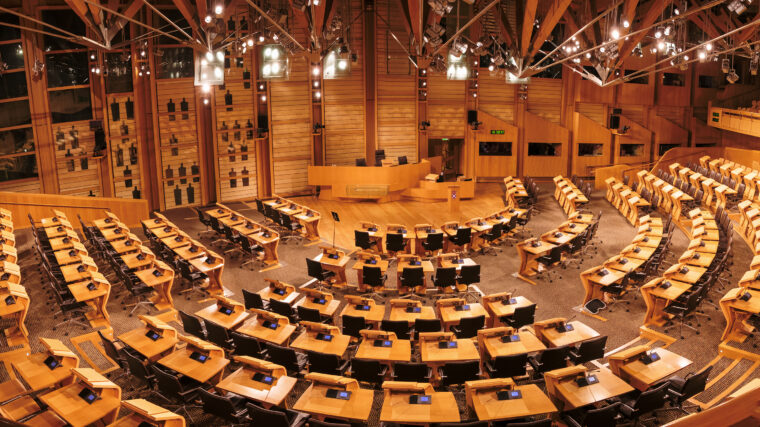Not again! Just when you thought it was safe to get on with rewriting every course in the curriculum and trying to make hand sanitiser come out of the hot taps, Policy Exchange has published another report on academic freedom to get stuck into.
It was, perhaps, a bit odd to see universities having to “demonstrate their commitment to academic freedom and free speech” as a condition of accessing bailout funding in the Department for Education’s restructuring regime. Does the coronavirus spread through snowflakes now?
It was even odder to see the Office for Students announce that it will issue regulatory guidance this autumn on its public interest governance principles relating to academic freedom and free speech “because these principles underpin high-quality higher education”, having spent three years insisting that it only cares about outcomes.
Now we know why. Universities Minister Michelle Donelan:
It is deeply concerning the extent to which students and academics with mainstream views are being silenced and discriminated against in our universities.”
Academic freedom: the extended directors’ cut
In November when Gavin Williamson’s Spad Iain Mansfield was briefly Head of Education at Policy Exchange, “Britain’s most influential think tank” published something called “Academic freedom in the UK” – a 9,300-word diatribe on academic freedom that got mixed up with freedom of speech, headlined on press-baiting polling that said right-wing students felt unpopular, and contained a raft of sometimes nonsensical policy recommendations for universities, government and civil society.
This, it turns out, was merely a trailer – whetting our appetite for a whopping 47,500-word version that says most of the same things in most of the same order in much the same way.
It matters because as my colleague David Kernohan pointed out on the site at the time, the rumour was that there was nearly legislation on this stuff in the Queen’s Speech – but for the intervention of former Universities Minister Chris Skidmore deciding that there were bigger priorities.
He’s gone now (to be on the Board of the UPP Foundation, no less) replaced with a much more “on message” minister – and you’ll remember that very shortly before lockdown in the aftermath of the Amber Rudd not-actually-no-platformed affair, a “source close to Gavin Williamson” was briefing the press about an 11-clause bill on this very subject.
Never let an 11-clause bill go to waste in a crisis, or whatever that phrase is.
Left wing remoaners
First up there are 14,000 words on the history and definition of academic freedom. There’s neither nothing particularly wrong with it, nor nothing I couldn’t argue with if I so wanted to – but reading it is much like being hectored at by a pub bore on the subject who wins their argument by droning on longer than you when you’re keen to get the last tube home.
Next, some data. Last time round students were the focus, but this time the press-baiting polling centres on academics. And you do get the mild impression that strenuous efforts have been made to ask the questions that will give the answers the authors want to see.
820 academics responded to YouGov’s poll, although only 484 of those were currently employed – and just under half of the sample (47%) teach in social sciences, humanities, arts, psychology or in education.
In this sample 53% identified as left, 35% as centrist, and 9% as right – which it says shows that UK academics are significantly more left-leaning today than before, with fewer than 20% voting for right-leaning parties, and about 75% voting for the Labour/Liberal Democrat/Green parties in 2017 and 2019. Much of this, it says, is explained by the association of advanced education and political preferences. Maybe Policy Exchange is in favour of contextual admissions for academic staff.
Most of the questions asked of academics in the survey are a treat I won’t spoil here (you can see the full cross tabs here), but whilst there’s little support for “dismissal campaigns” against colleagues, the report does manage to clickbait-conclude that 1 in 4 academics were willing to countenance campaigns against “controversial research”.
When you actually dig a bit, you see that this, in reality, refers to 1 in 4 social science and humanities academics willing to countenance campaigns against at least one of four areas of “controversial research”. And when you dig even further, you find that we’re not talking about research questions but highly implausible research conclusions, as in:
If a staff member in your institution did research showing that greater ethnic diversity leads to increased societal tension and poorer social outcomes, would you support or oppose efforts by students to let the staff member know that they should find work elsewhere?
Other examples were “research showing that the British empire did more good than harm”, “research showing that children do better when brought up two biological parents rather than by single or adoptive parents” and research “showing that having a higher share of women and ethnic minorities in organisations correlates with reduced organisational performance”.
One featured line of qualitative feedback surely qualifies into this year’s Didn’t Happen of the Year Awards:
A previous line manager had a large photo of Jeremy Corbyn on his desk. When I failed to approve (I said nothing) he had me removed from the programme despite very positive feedback.” – Centrist remainer.
Buried in the findings we discover that those on the right are more willing to discriminate against those on the left than the reverse (20% as against 15%) and that other results “reveal an important reservoir of support for academic freedom among staff at British universities.”
Nevertheless, “the minority may exert an outsized effect on the academic climate, restricting freedom”. It would have to really.
Lunch break
We also discover that (outrageously) people like hanging out socially with people like them – only 54% of academics said that they would feel comfortable “sitting next to a known Leave supporter at lunch”, but again a dig tells us that only 14% of remainers expressed discomfort, without either switching the question around or comparing to wider society.
The other “neither agree not disagree” third were probably either thinking “there hasn’t been anywhere for staff to sit and have lunch on our campus since 1996” or maybe “I haven’t actually had time to have lunch in this job since 1996.”
28% of this sample being uncomfortable sitting next to someone who advocates gender-critical views is probably much lower than most would guess, but their other killer fact is that “a third of academics would seek to avoid hiring a known Leave supporter”, and “between a third and a half of those reviewing a grant bid would mark it lower if it took a right-wing perspective”.
To get there the research with YouGov uses a “list experiment” which it says circumvents people’s tendency to conceal their true motives due to social pressure not to admit to discrimination. What it doesn’t do is address the fact that only 12% of the sample is currently in a position to do any hiring.
It does accept that academics do not discriminate more than other professions, nor does left discriminate more than right – but because of the small number of academics who identify as on the right, it argues that there is a structural discriminatory effect against them:
Importantly, this demonstrates that the “chilling effect”, whereby dissenting views are not stated publicly, occurs not just due to a fear of feeling uncomfortable. Rather, it is a rational response – particularly for younger academics – to a workplace in which expressing such views may have a negative impact on their careers.”
What all of this amounts to is that right wing or leave-inclined academics might be being discriminated against by not being hired by people in no position to hire them or by being avoided by people who disagree with them in their spare time. In other words, Policy Exchange has discovered that it’s cooler to be a left-wing remainer if you’re an academic mainly in the social sciences in HE when right wing parties keep banging on about shutting courses you teach on and when Brexit probably means you’ll lose loads of research funding.
So how might we address the plight of these plucky, right wing underdogs? How, dear reader, do we make being a right-wing social sciences academic more… cool?
Proposals
There’s a long, long section on the law that predictably overcooks “freedom to” (speak) and undercooks “freedom from” (harassment and harm) and then eventually – 35,000 words in – we get to some proposals. They’re quite something, and if this is, in effect, the briefing document for that mooted 11-clause bill, we should all be very afraid.
The proposals address two sorts of issues in two sorts of ways. The first is attempts to “penalise” someone’s speech not by rebutting the arguments, but by “campaigning” – to have them sacked, or by seeking to disrupt an event or have it cancelled. The practicalities of drawing this neat distinction are glossed quickly.
To address this sort of thing – without ever really acknowledging the preposterousness of suggesting rules, in the name of freedom, that would remove students’ and academics’ right to campaign – we get a new Director for Academic Freedom on the OfS board whose appointment process and role is framed like the Director of Fair Access, only for the other side of the culture wars. Fight! Fight!
They would have the “capacity and responsibility for individual redress” – OIA will be thrilled that it has dodged this particular bullet, because unlike the rest of OfS, the proposal explicitly wants this post to act as an ombudsperson in individual complaints. Great news! An HE ombudsperson that will look at academic judgement after all!
Next, the employment tribunals and courts would have jurisdiction to determine whether academic freedoms have been violated for individuals or groups. The proposals never really talk about how a university is supposed to stop individuals across the student body from campaigning in a way that might “restrict” academic freedoms in the way described – but academic staff would somehow win an employment tribunal if it happened.
Given right now we can’t figure out how to stop a student hosting a houseparty in a lockdown, I’d chalk this one up as “optimistic”.
Defend the union
Highly amusingly, there’s even an alternative to that Director proposal included, which I’m going to call the Toby Young proposal:
Authorise the Director for Academic Freedom at the OfS to give legal assistance to individuals who allege that their academic freedom or freedom of speech has been violated. This legal assistance would include the ability to provide or arrange for the provision of legal advice, legal representation, facilities for the settlement of a dispute, or any other form of assistance.
Amazing. Tobes might well end up on the OfS board after all – and he’ll get to bring his Free Speech Union with him!
We also get some legal shenanigans designed to tip that “freedom to” (speak) v “freedom from” (harassment and harm) balance a bit towards “freedom to”, and a proposal to being students’ unions directly under the purview of the Education Act 1986 without ever mentioning who would do the enforcement. OfS will not be keen to be creating a register of SUs, and the Charity Commission thinks it’s on top of this one already.
The second set of issues is what it calls a “softer focus” problem, framed as “political discrimination” and to be dealt with through in the same way that all other forms of discrimination are in the sector – education, training, charters, “whole institution” commitments and even league tables.
This 15,000 word set of additional stuff is amazing – it’s like the authors have gathered every single theory of change ever tried in the sector, and then run academic freedom through it. There’s an expansion of the National Student Survey to include questions designed to elicit students’ experience of political discrimination, proposed amendments to the big league tables to include an academic freedom “indicator”, a seed-funded Academic Freedom charter organisation on the same model as Athena Swan, and an Academic Freedom Champion in every university, who would report directly to the Vice-Chancellor, with support staff as appropriate.
The good news for opponents of these proposals is that decades of this has hardly made universities less racist, sexist, disablist or homophobic – so I’m doubtful it’ll have the desired effect here either. Give it a decade and the Taxpayer’s Alliance will be moaning about the waste.
Chill out
So, the best part of 50,000 words later – will any of this make a difference? That all depends, really. There is something genuinely chilling about laws trying to make being a right wing sociologist more cool, or banning student protest in the name of freedom. But I’d be surprised if all this got that far.
The debate that is coming over both the report and what is bound to be an impending bill will be as tortuous and fact-free as it always is. Are there bigger problems in society or the sector right now? Yes, there are. Will that matter? No, it won’t.
There’s definitely something strangely analogue-in-a-digital-age about the proposals – supposing as they do that a long-winded way of describing “cancel culture” can be meaningfully controlled via restrictions on institutions like universities or students unions. Policy Exchange can debate over 1,000 words whether an SU should conform to “public norms” ‘til it’s blue in the face – the rest of the world has worked out that it’s the decentralised nature of this new kind of collective accountability that makes it so powerful on the one hand, or principal-Skinner style terrifying on the other.
Richard Brabner puts all of this really well – albeit from a different perspective to mine – over on HEPI’s blog. The interaction between “new” social media and “old” institutional culture is pretty tricky, particularly if the “old” institutional culture is supposed to offer structured debate and diversity in viewpoints. Whether university employers should expect a level of civility in professional conduct on public social media channels, and whether universities could or should expect similar from their enrolled students is an interesting question. For all of Policy Exchange’s words, you’ll struggle to find arguments with this level of subtlety or sophistication in the text.
And if you are one of those people that think there is a real problem with the way Trans issues are handled in academia right now – I absolutely promise you that the solution is probably not in here.
In the end, whether we get that 11-line bill or not, whatever happens next will probably in the long term mean that some more forms will have to be filled in, some more boxes will have to be ticked, and everyone will get on with their lives. Most of us, if we have the chance, will still have lunch with people we disagree with (“god, if only right now”), most sociologists will vote Labour, and most students will still lean to the left and move to the right when they (if they ever) buy a house or get hitched.
And then the debate will reappear again in thirty years. Like it always does.













As a counterpoint, I as a research fellow at a Russel group university, will be fighting the imposition of a restricted reporting order the “factual basis” of a claim to an employment tribunal in the next fortnight. Because that order has yet to be decided upon I hope you understand that there will be some vagaries in detail, but I am fighting it as despite it involving a sensitive topic of research which is the basis of their imposition, the risks have been disproportionally described and the claim is a result of ongoing institutional failures the university has refused to acknowledge.
The circumstances of the claim are such that career wise an RRO would be optimal, but ethically I can’t accept it.
You say thirty years, I’d give a more specific figure of approximately 27, and that debate appeared because of the great battle in Swansea. The Davis report, as we’re now back to a time were university visitors had powers, made it clear that academic freedom did encompass freedom to criticise the institution, rather then just the voicing of specialised academic opinions related to their expertise, so there are parallels.
The education act 1988 is really the only legislative tool that protects staff in relation to academic freedom and my understanding is that a university commissioner has not been appointed for some time. Meanwhile the norms of academic freedom, which were corrected by the great battle in Swansea as universities took note, have been generally eroded (self-evidently by the attempted gag order). This also has limited to my set of viable responses to either continuing to batter against brick walls in the university, or nuclear options that has collateral damage to the universities reputation, which remains a factor of utmost concern for me.
From a cost point of view in regard to everyone’s time therefore, why don’t we just engage in the idea and get academic freedom properly enshrined in law, in the right way and by the right people? For clarity, university ordinances are insufficient (again self-evidently).
One that protects both individual academics and institutions from further erosion of their rights and freedoms (as both have been from the continued impositions of other legislation) and makes it difficult for the norms to be eroded again. The OfS while independent(?) has other objectives and needs, which require the co-operation of the government.
This is particularly relevant as if we actually had one right now, the government wouldn’t be able to tie an essential bail out that will be of undeniable benefit to the UK as a whole to a ridiculous argument that doesn’t quite get the concept of academic freedom. Change the debate, say yes! But make it truly about academic freedom rather then this warping of the concept.
Even if the only thing that come’s out of it is a increase in the interim period of the debate, I for one would prefer to have this debate held once every forty years, which may or may not have something to do with my projected retirement age.
To summarise: a political partisan is happy for the political culture in universities to be on his side. Nobody ever doubted that. The problem that the report identifies, in prose more measured than this article’s, is that campus culture has become unmoored from the rest of the country’s. Many academics have become so intolerant of mainstream views (e.g. advisability of Brexit) that our institutions are losing the ability to understand or debate them. You can keep on making fun of “un-cool” conservative academics, and watch universities lose more public support, or you can look beyond your own prejudices.
I wonder how this clause will function in those HEIs which explicitly forbid legal representation during ‘processes’: “Authorise the Director for Academic Freedom at the OfS to give legal assistance to individuals who allege that their academic freedom or freedom of speech has been violated. This legal assistance would include the ability to provide or arrange for the provision of legal advice, legal representation, facilities for the settlement of a dispute, or any other form of assistance.” I hope this is a magic money tree because I can foresee a rash of claims, but perhaps not from the side Donelan imagines.
This comment will be lost in a tread of nonsence.
The article is an example of the mote and the beam. Its author complains about some dust specks in the necessary case to protect the ability to think independently on campus. The beam is the weight of left-leaning opinion on WONKHE and its editorial espousal of orthodoxy. Prediction for 2021: reader comments on this site will be discontinued as they have been on the major US sites Inside HE and Chronicle of HE. What is happening goes even beyond censorship: there is pressure to espouse a particular set of values or to suffer disproportionate consequences. This is the very definition of totalitarianism.
Just out of interest: you do know that most people in the UK would now vote against Brexit, if they had the chance?
They might have then, but some of the most ardent remainers I know now question their position in light of the EU’s ongoing vaccine debacle.